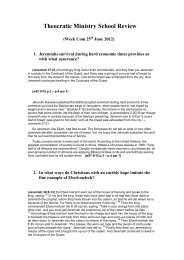1964 Awake! - Theocratic Collector.com
1964 Awake! - Theocratic Collector.com
1964 Awake! - Theocratic Collector.com
You also want an ePaper? Increase the reach of your titles
YUMPU automatically turns print PDFs into web optimized ePapers that Google loves.
to drive on the oPlXlSite side of the road<br />
from that which was heretofore the custom.<br />
What would it be like? Would you<br />
chance driving that morning? There is<br />
reason to believe that it would be hard on<br />
the nervous system. Driving on the opposite<br />
side may appear simple at first, as<br />
when a tourist quickly learns to adjust<br />
himself to opposite rules in force when<br />
driving in a foreign country. But it must<br />
be remembered that the visitor has the advantage<br />
of driving in an environment already<br />
adjusted to the rule in force and<br />
consequently misjudgments are avoided by<br />
simply observing what other native motorists<br />
do. Even with an ample warning,<br />
it is estimated that if a change were made<br />
it would bring a lO-percent increase in accidents<br />
for each of the first three years.<br />
Should such a change be<strong>com</strong>e effective,<br />
it is suggested that 5 a.m. on a Sunday<br />
morning would be<strong>com</strong>e the zero hour. Four<br />
or five hours prior to this moment all except<br />
essential traffic would be strictly<br />
forced to a standstill. During this time a<br />
massive operation would take place to<br />
change thousands of road signs and traffic<br />
control devices. All "Keep Left" signs<br />
would have to read "Keep Right." All "No<br />
Right Turn" signs would have to read "No<br />
Left Turn." A large number of temporary<br />
signs would need to be installed at critical<br />
areas to remind all drivers to keep to the<br />
right. Many of these signs could be installed<br />
beforehand but covered over until<br />
the standstill period arrived.<br />
The traffic flow in some one-way streets<br />
would need reversal, and one of the greatest<br />
problems facing a changeover is to<br />
quickly alter the double center lines and<br />
A Reason for Not Smoking<br />
all other painted directional markings on<br />
the road pavements. Some of these markings<br />
are so difficult to obliterate that it<br />
would mean a <strong>com</strong>plete resurfacing of the<br />
pavement area.<br />
There are such additional problems as<br />
rechanneling traffic at intersections where<br />
traffic islands have been constructed. In<br />
some cases reverse lanes would need construction,<br />
otherwise it would be impossible<br />
to turn at these intersections. Some exits<br />
and entrances of freeways would need modification,<br />
otherwise it would not be possible<br />
to get off them once you got on, that<br />
is, if you found a way of getting on.<br />
Legal problems doubtless would arise.<br />
Most likely, present policies of insurance<br />
<strong>com</strong>panies with their clients would need<br />
amending. It would be reasonable to expect<br />
that for some time after a change<br />
insurance <strong>com</strong>panies would increase their<br />
rates to cope with the inevitable increase<br />
in accidents and personal injury as well as<br />
property damage.<br />
Additionally, the huge amount of statutory<br />
regulations and road laws would need<br />
amending, such as who has the right of<br />
way at an intersection, and so forth.<br />
Designers are hard at work to alleviate<br />
some of these problems. They have thought<br />
of a center stick control for automobiles<br />
and, for the future, "automatic highways"<br />
where all the driver does is set his in·<br />
struments and relax with his passengers<br />
while the electronic brain guides the vehicle<br />
to the desired destination-he hopes.<br />
But until that time arrives, it appears that<br />
at least for many years to <strong>com</strong>e uniform<br />
rules internationally will be followed only<br />
by ships at sea and by the airways.<br />
• "'If I start smoking cigarettes, will my chances of dying of lung cancer go up<br />
significantly?' The answer, as we have seen, is Yes .... 'If I stop smoking them,<br />
will my chances of getting lung cancer go down?' The answer is again Yes."<br />
-Consumer Reports, June 1963.<br />
MARCH 8, <strong>1964</strong>- 23




